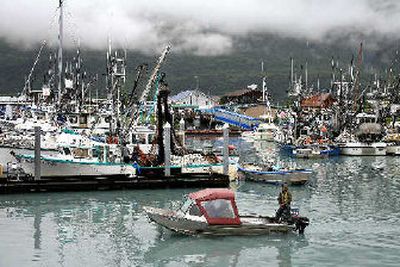Pipeline to the good life

VALDEZ, Alaska — Valdez is a company town where people living off big oil have lovely cedar-sided homes with lush lawns and new four-wheelers parked in driveways next to RVs the size of city buses.
Across the street or next door are residents not employed in the oil industry who sometimes have to work two and three jobs to live in dilapidated mobile homes set up on weed-filled gravel lots.
Valdez is a city of the “haves” and the “have-nots.”
It also is the end point for the 800-mile trans-Alaska pipeline from the North Slope, but the crisis of reduced production this month has little, if any, immediate impact on the town. However, City Manager John F. Hozey says it does send the city a message.
“It is kind of a wake-up call to realize what happens when you put all your eggs in one basket,” he said.
Valdez is where the Alyeska Pipeline Service Co., operator of the pipeline, has a marine terminal where tankers are loaded with crude for delivery to West Coast refineries.
The terminal’s 18 large crude oil tanks, each with a holding capacity of 510,000 barrels, are dwarfed only by the Chugach Mountains that surround the town of 4,450 residents.
From his corner office at the marine terminal, Tom Stokes, 50, gets to take in the view.
“It is a stunning place to live,” said Stokes, manager of the Valdez Marine Terminal. From his office window, he says he can see eagles soaring by, sea otters swimming in the harbor and an occasional black bear sauntering past.
“It is a good place to work. A good community. We are pretty proud of what we do,” Stokes said.
More than 800 tankers a year used to arrive at the Valdez terminal to be loaded with crude. Now, the terminal gets about 360 tankers a year. Stokes said there has not been a leak of crude oil at the terminal for more than two years.
“That is a pretty significant drop-off,” Stokes said.
Alyeska has been downsizing in recent years and now employs about 285 people in Valdez. At the peak of construction of the terminal, 4,300 were employed — probably more than live in the city now. The average salary last year for Alyeska employees was $92,000.
But the city is hard on people living outside the oil circle, even more so as the volume of oil coming into town dwindles.
The average salary for residents in the Valdez-Cordova census area is $3,484 a month, or about $41,000 a year — but the yearly figure does not account for many residents who find seasonal employment only, according to the State Department of Labor and Workforce Development. Employment increases substantially during the summer months and falls off in the winter when Valdez normally gets more than 26 feet of snow.
“It is a fight,” said Richard Fraley, director of maintenance at one of the city’s nicer hotels. He paid $14,000 for a 22-year-old trailer, what he calls his “shanty trailer.” If he thought he could get more than $5,000 for it now, he’d consider moving.
“There are people who can’t afford to get out of town,” said Fraley, who also works as a plumber’s assistant and puts out floating boom to safeguard again possible leaks by the fuel barges to make ends meet.
Jamie Hillberg, 23, the hotel’s front desk manager, said half her take-home pay goes to rent a modest $800 one-bedroom apartment.
“I live paycheck to paycheck. I can’t even afford to fix my car,” she said.
Hillberg made her escape to Seattle but returned to be close to family. She said young people graduating from high school don’t want to stay in Valdez because they don’t see any opportunities for them.
“The main feeling when you get out of high school is, ‘I can’t wait to get out of this town,”’ she said.
City manager Hozey said between one-third and one-half of the town’s work force have jobs related to the marine terminal, but none are as high-paying as the Alyeska Pipeline Service Co. jobs. While he stresses that the city has a good relationship with Alyeska, it’s been strained with the oil companies.
More important to the town is the tax revenue it gets from the trans-Alaska pipeline. The town receives about 70 percent of its income from the oil industry.